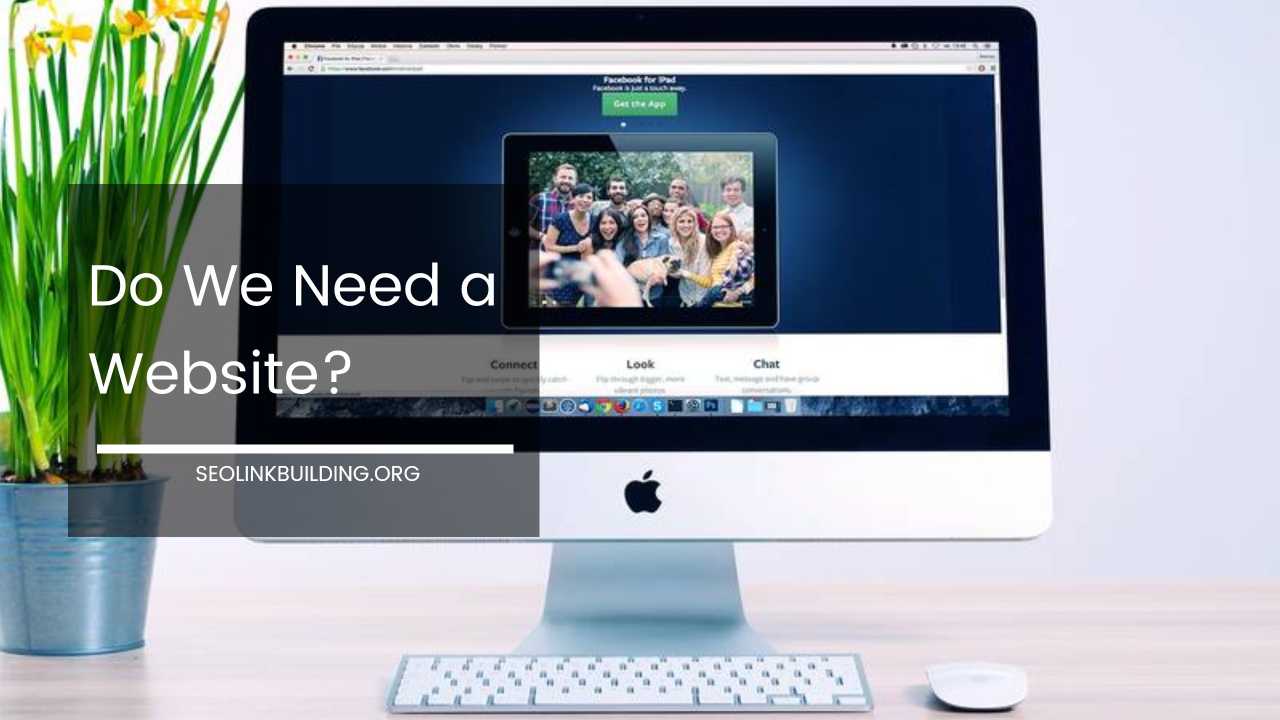Do We Need a Website?

Do We Need a Website in the Digital Age? A Comprehensive Guide
In today’s digitally driven world, the question of “Do we need a website?” is no longer a binary one. While social media platforms and alternative online tools offer undeniable value, a website remains a cornerstone of a robust online presence.
It’s a platform that fosters trust, empowers content marketing, and provides a foundation for growth. This comprehensive guide delves into the enduring power of websites in the digital age, exploring eight key reasons why they remain essential for businesses, individuals, and organizations alike.
1. Building Trust and Credibility: Your Digital Storefront
Imagine searching for a local bakery and encountering two results: one with a visually appealing website showcasing mouthwatering pastries and detailing their commitment to fresh, organic ingredients, and another with just a basic Facebook page. Which one inspires more confidence and compels you to visit?
A website acts as your digital storefront, a dedicated space to meticulously curate your brand identity and establish yourself as a legitimate entity.
Professional design, clear and informative content, readily accessible contact information, and positive client testimonials all contribute to building trust and credibility with your target audience. Think of it as a meticulously crafted resume for the online world.
Social media profiles, while valuable for fostering connections and brand awareness, can often feel fleeting and impersonal.
A website allows for a more comprehensive introduction, showcasing not just your offerings but also your team’s expertise, experience, and the values that drive your business.
It demonstrates your commitment and investment in your field, fostering a sense of security and trust that fleeting social media posts often struggle to achieve.
2. Owning Your Online Space: Freedom and Control
The ever-evolving landscape of social media platforms presents a significant challenge. Algorithms and policies are subject to change, and relying solely on these platforms for your online presence exposes you to the potential for disruptions.
Imagine pouring your heart and soul into building a vibrant community on a particular platform, only to have them change their terms of service or even shut down entirely.
A website, however, empowers you to take complete control over your online space. You determine the design, content, user experience, and functionality. This freedom allows you to tailor your website to your specific needs and target audience, ensuring a consistent brand message and a user experience that resonates with your visitors.
Think of social media as a rented apartment, subject to the whims of the landlord (the platform). A website, on the other hand, is your own house – you can customize it, renovate it, and build upon it as you see fit.
While social media remains a fantastic tool to connect and engage with your audience in real-time, your website serves as your central hub, the foundation upon which you build your online identity and cultivate long-term relationships.
3. Search Engine Optimization (SEO) and Increased Visibility: Getting Found Online
In today’s digital world, where information overload is a constant struggle, discoverability is paramount. When people seek products, services, or information online, they turn to search engines like Google.
A well-optimized website with relevant keywords and informative content can significantly improve your ranking in search results, driving more qualified traffic to your doorstep.
Social media platforms are not optimized for search engines, making it difficult for potential customers to find you organically. You can’t control how a social media platform displays your profile in search results.
A website, on the other hand, allows you to target specific keywords and tailor your content to attract the right audience, propelling you higher in search rankings and increasing your online visibility.
Imagine a bustling marketplace – social media is like having a booth tucked away in a corner, while a well-optimized website positions you right at the front, with a clear sign and inviting displays that attract potential customers.
4. Content Marketing and Lead Generation: From Informing to Converting
A website empowers you to become a thought leader in your field. By publishing informative blog posts, insightful case studies, or downloadable white papers, you establish yourself as a valuable resource and attract potential customers seeking solutions.
This content marketing strategy not only educates your audience but also builds trust and positions you as an authority.
Social media, while excellent for quick engagement and sharing snippets of information, often struggles to house in-depth content.
A website allows you to create a comprehensive content library that showcases your expertise, educates your audience, and fosters trust. Additionally, forms, email capture tools, and clear calls to action can transform your website into a powerful lead generation machine.
Imagine attending a conference – social media is like handing out flyers with a catchy slogan, while your website is a detailed brochure that delves into the benefits of your product or service, capturing leads and nurturing them through the sales funnel.
5. E-commerce and Direct Sales: Turning Visitors into Customers
If you’re looking to sell products or services online, a website is an indispensable tool. It allows you to showcase your offerings in detail, process transactions securely, and manage customer relationships efficiently. This streamlines the buying process for your customers and empowers you to take control of your sales channel.
While some social media platforms offer limited e-commerce functionalities, a website provides a dedicated platform to control the entire sales process. Here’s how a website trumps social media for e-commerce:
-
Product Presentations: You can create dedicated product pages with high-quality images, detailed descriptions, variations, and customer reviews. This comprehensive product information builds trust and encourages informed purchasing decisions.
-
Shopping Cart Functionality: A website allows you to integrate a user-friendly shopping cart system, enabling customers to seamlessly add and remove items, calculate shipping costs, and complete secure online transactions. Social media platforms often redirect users to external websites for purchases, creating an additional friction point in the buying journey.
-
Payment Gateways: You can integrate secure payment gateways with your website, offering customers a variety of payment options such as credit cards, debit cards, and digital wallets. This convenience fosters trust and encourages impulse purchases. Social media platforms may have limitations on the types of payment methods available.
-
Customer Relationship Management (CRM): A website allows you to collect customer data through forms and registrations, enabling you to personalize future interactions and build long-term relationships. You can offer exclusive discounts, targeted promotions, and loyalty programs, all within your controlled website environment.
Imagine running a bakery – social media is like showcasing your pastries in a beautiful photo album, but the customer still needs to visit a physical store to make a purchase.
A website, on the other hand, is your own online bakery, with a virtual storefront displaying your products, a shopping cart for easy selection, and secure payment options to complete the transaction conveniently.
6. Building Relationships and Community: Fostering Loyalty
A website goes beyond just static information – it can be a dynamic platform for fostering connections and building a loyal community around your brand. Here are some ways to achieve this:
-
Comment Sections and Forums: Enable comment sections on blog posts or create dedicated forums where users can engage in discussions, share experiences, and ask questions. This fosters a sense of community and allows you to directly interact with your audience. While social media comments offer similar functionality, website forums can be more structured and focused on specific topics.
-
Membership Areas: Create exclusive membership areas on your website offering premium content, discounts, or early access to new products. This incentivizes users to register and become part of a valued community. Social media groups offer a similar function, but membership areas on your website provide a more controlled environment.
-
Testimonials and Reviews: Showcase positive testimonials and customer reviews on your website. Social proof builds trust and credibility, encouraging potential customers to engage with your brand. While social media reviews can also be valuable, website testimonials allow for more detailed and curated feedback.
Imagine a local sports team – social media is like having a fan page where supporters can leave comments, but a website allows you to create a dedicated fan club with exclusive content, member forums, and a strong sense of community.
7. Data and Analytics for Informed Decisions: Making Data-Driven Choices
Understanding your audience is crucial for success in any online endeavor. Website analytics tools provide valuable insights into user behavior, such as:
-
Traffic Sources: Identify where your website traffic is coming from – search engines, social media platforms, or direct referrals. This knowledge empowers you to optimize your marketing efforts and target the right audience.
-
Popular Content: See which pages and content on your website are attracting the most visitors and user engagement. This allows you to focus on creating content that resonates with your audience and achieves your goals.
-
Visitor Demographics: Gain insights into the demographics of your website visitors, such as age, location, and interests. This knowledge empowers you to tailor your website content and marketing messages to better connect with your target audience.
Social media analytics are helpful, but website analytics offer a more detailed picture. They provide a wealth of data that allows you to make data-driven decisions about your website content, marketing strategies, and user experience.
Imagine running a restaurant – social media analytics tell you how many people saw your latest post about a new dish, while website analytics reveal which pages users visited after seeing the post, how long they spent on the menu page, and where they dropped off in the reservation process.
This granular data allows you to identify areas for improvement and optimize your website to convert more visitors into paying customers.
8. A Scalable Platform for Growth: Adapting and Expanding Your Online Presence
As your business, project, or personal brand evolves, your website can grow alongside it. Here’s how a website offers superior scalability compared to social media platforms:
-
Content Expansion: Easily add new pages to your website as your offerings or expertise expand. Create dedicated service pages, product categories, or blog archives to organize your content and improve user experience. Social media platforms often have limitations on the amount of content you can display on your profile.
-
Feature Integration: Integrate new features and functionalities into your website as your needs change. You can add e-commerce functionality, online appointment scheduling tools, membership areas, or live chat features to enhance your website’s capabilities. Social media platforms offer limited customization options, making it difficult to integrate advanced features.
-
Future-Proofing: A website allows you to adapt to the ever-changing digital landscape. You can update your website design, content, and functionality to stay relevant and competitive. Social media platforms constantly update their algorithms and interfaces, forcing you to adapt to their changes without much control over your own presence.
Imagine building a house – social media is like renting a small apartment, with limited space and customization options. A website, on the other hand, is your own plot of land where you can build a house, expand it as needed, and add features to suit your evolving needs.
Final Word: Why Your Website Matters
In the digital age, a well-designed and informative website remains a cornerstone of a strong online presence. It allows you to build trust and credibility, attract a wider audience, and achieve your goals, whether you’re a seasoned entrepreneur, a passionate artist, or an aspiring blogger.
While social media platforms offer valuable tools for engagement and community building, a website provides a central hub where you control the narrative and cultivate long-term relationships with your audience.
By harnessing the power of SEO, content marketing, and data analytics, your website can become a powerful engine for growth and success in the ever-evolving digital world.













